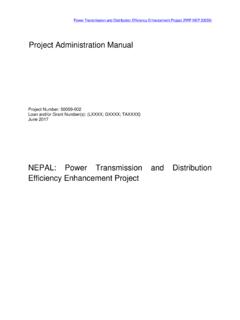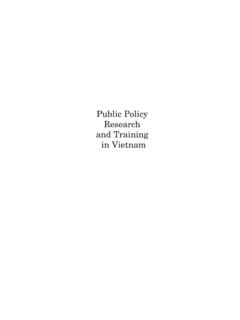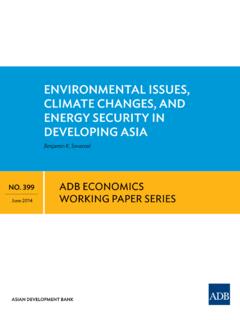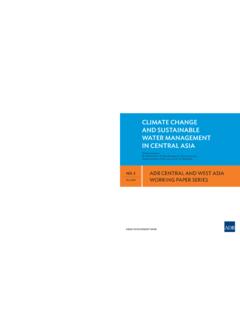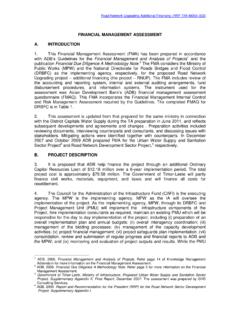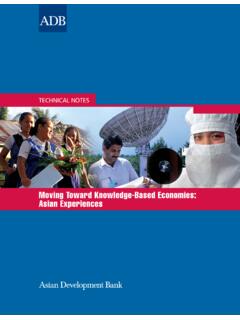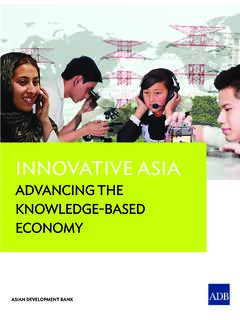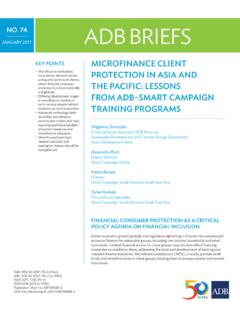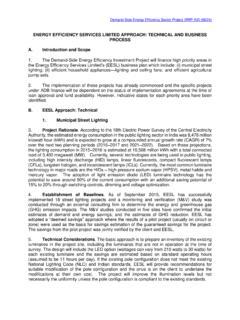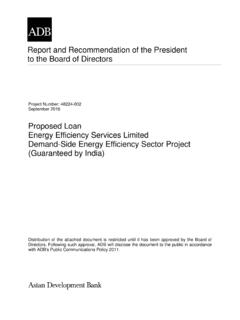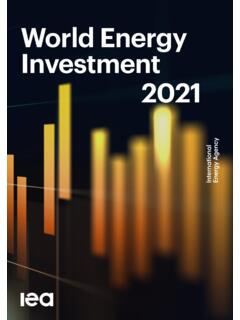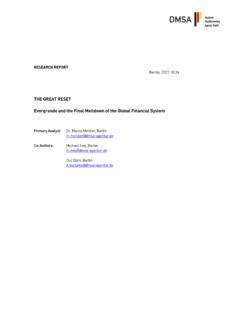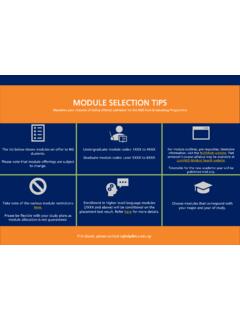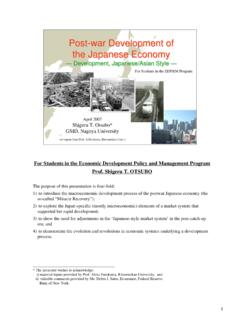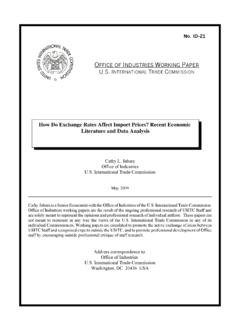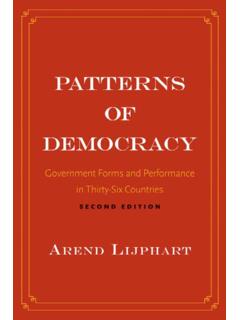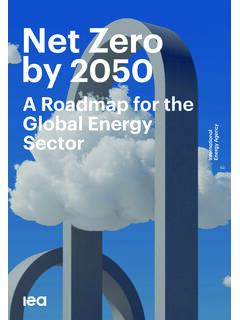Transcription of Asian Development Bank Institute
1 ADBI Working Paper Series COVID-19 IMPACT ON MICRO, SMALL, AND MEDIUM-SIZED ENTERPRISES UNDER THE LOCKDOWN: EVIDENCE FROM A RAPID SURVEY IN THE PHILIPPINES Shigehiro Shinozaki and Lakshman N. Rao No. 1216 February 2021 Asian Development Bank Institute The Working Paper series is a continuation of the formerly named Discussion Paper series; the numbering of the papers continued without interruption or change. ADBI s working papers reflect initial ideas on a topic and are posted online for discussion. Some working papers may develop into other forms of publication. Suggested citation: Shinozaki, S. and L. N. Rao. 2021. COVID-19 Impact on Micro, Small, and Medium-Sized Enterprises under the Lockdown: Evidence from a Rapid Survey in the Philippines.
2 ADBI Working Paper 1216. Tokyo: Asian Development Bank Institute . Available: Please contact the authors for information about this paper. Email: Shigehiro Shinozaki is a senior economist and Lakshman N. Rao is a statistician, both at the Economic Research and Regional Cooperation Department of the Asian Development Bank. The views expressed in this paper are the views of the author and do not necessarily reflect the views or policies of ADBI, ADB, its Board of Directors, or the governments they represent. ADBI does not guarantee the accuracy of the data included in this paper and accepts no responsibility for any consequences of their use. Terminology used may not necessarily be consistent with ADB official terms.
3 Working papers are subject to formal revision and correction before they are finalized and considered published. The authors would like to thank the Bureau of Small and Medium Enterprise Development of the Department of Trade and Industry of the Republic of the Philippines and the Philippine Chamber of Commerce and Industry, which were partners in conducting the survey. They also thank Dave Pipon, Jude David Adarna Roque, and Josephine Penaflor Ferre for their research assistance. Asian Development Bank Institute Kasumigaseki Building, 8th Floor 3-2-5 Kasumigaseki, Chiyoda-ku Tokyo 100-6008, japan Tel: +81-3-3593-5500 Fax: +81-3-3593-5571 URL: E-mail: 2021 Asian Development Bank Institute ADBI Working Paper 1216 Shinozaki and Rao Abstract The novel coronavirus disease, COVID-19, has brought significant change to people s lives and business activities nationally, regionally, and globally.
4 The Philippines took swift action including enhanced community quarantine (ECQ) to contain the pandemic and launched an emergency subsidy program with massive public spending to support disrupted households and businesses. The strict lockdown ran from mid-March to the end of May 2020 in the national capital region and high-risk provinces, causing huge economic losses. Six months after the March lockdown, the Philippine economy has moved to the recovery stage, but micro, small, and medium-sized enterprises (MSMEs) are continuing to confront a sharp drop in demand and revenue. This paper examines the initial impact on MSMEs of the ECQ and lockdown measures using evidence obtained from a rapid nationwide survey conducted from the end of March to mid-April 2020 and derives policy implications.
5 Keywords: COVID-19, economic crisis, economic impact, MSMEs, SME Development , access to finance, SME policy, Philippines JEL Classification: D22, G20, L20, L50 ADBI Working Paper 1216 Shinozaki and Rao Contents 1. INTRODUCTION .. 1 2. INITIAL NATIONAL RESPONSES TO THE COVID-19 PANDEMIC IN ASIA .. 2 3. METHODOLOGY .. 6 Data Structure .. 7 Weighting the Survey Data .. 8 Analytical Approach .. 11 Linear Probability Model .. 12 4. PROFILE OF THE SURVEYED 13 5. FINDINGS FROM THE DESCRIPTIVE STATISTICS AND ECONOMETRIC ANALYSES .. 15 Impact on MSME Sales .. 21 Impact on MSME Revenue .. 22 Employment during the COVID-19 24 Wage Payments during the COVID-19 Pandemic .. 26 Financial Condition during the COVID-19 Pandemic .. 27 6. POLICY IMPLICATIONS .. 30 Identifying Focus Groups for Assistance.
6 33 Differentiating Policy Measures by Firm Size .. 33 7. CONCLUSION .. 34 REFERENCES .. 35 ADBI Working Paper 1216 Shinozaki and Rao 1 1. INTRODUCTION The novel coronavirus disease, COVID-19, has significantly altered people s lives and business activities at the national, regional, and global levels. The Philippine government responded promptly, imposing enhanced community quarantine (ECQ) to contain the spread of COVID-19 and implementing an emergency subsidy program of massive public spending to support badly affected households and businesses. The lockdown or strict stay-at-home order started on 16 March 2020, initially covering the national capital region and high-risk provinces. The government extended it three times until the end of May 2020.
7 During the lockdown, the Philippine economy immediately experienced a sharp decline in domestic and foreign demand, international trade, national production, and consumer confidence. Together with funding constraints on businesses, it signaled the start of huge economic losses (ADB 2020c, 2020d). The Asian Development Bank (ADB 2020a) estimated that regional economic growth in developing Asia would decline sharply from in 2019 to in 2020 due to the pandemic s effects. As the contraction did not emanate from economic or financial turmoil, ADB forecast a rebound in regional economic growth in 2021. This assumed that the pandemic is contained by using expansionary fiscal and monetary policies among ADB s developing members.
8 The estimation indicated that the Philippine GDP would contract by in 2020, with an expected strong recovery to growth in 2021, assuming that the restrictions ease and businesses gradually reopen. According to the Philippine Institute for Development Studies (Abrigo et al 2020), the Philippines may suffer economic losses between billion and trillion due to the COVID-19 pandemic. The most affected business sectors will be manufacturing, with losses between billion and billion, wholesale and retail trade, with losses between billion and billion, and transport/storage/communication, with losses between billion and billion. Abrigo et al (2020) also estimated that, if the ECQ continued to May 2020, it would potentially cost the Philippine economy at least P150 billion given the decline in household consumption.
9 The COVID-19 crisis differs from the 1997 1998 Asian financial crisis and the 2008 2009 global financial crisis (GFC) as the primary cause was not regional or global economic or financial turmoil, suggesting a sharp recovery in 2021 from the significant contraction in 2020. The International Monetary Fund (IMF 2020a) estimated that the global economy would drop sharply by 3% in 2020, a far worse fall than occurred during the GFC. However, it will recover by in 2021, assuming that countries control the pandemic in the second half of 2020. The global economy has experienced epidemics in the past the Severe Acute Respiratory Syndrome (SARS) and the Middle East Respiratory Syndrome (MERS). The SARS outbreak in 2003 involved more than 8,000 cases affecting 26 countries, including Hong Kong, China; the People s Republic of China (PRC); Singapore; Taipei,China; and Viet Nam.
10 The MERS outbreak occurred in Saudi Arabia in 2012 and spread to several Asian economies, including Malaysia, the Philippines, the Republic of Korea, and Thailand. During the MERS outbreak, the number of micro, small, and medium-sized enterprises (MSMEs) fell by in the Philippines, with employment dropping by during 2012 and 2013. The numbers increased by and , respectively, after the outbreak settled down in 1 Authors calculation based on the Asia Small and Medium-Sized Enterprise Monitor 2020 database. ADBI Working Paper 1216 Shinozaki and Rao 2 The estimates of the pandemic s economic impact assume that countries will contain COVID-19 in 2020. However, if the pandemic is prolonged, with second and third waves, the economic damage will increase exponentially at the national, regional, and global levels.
